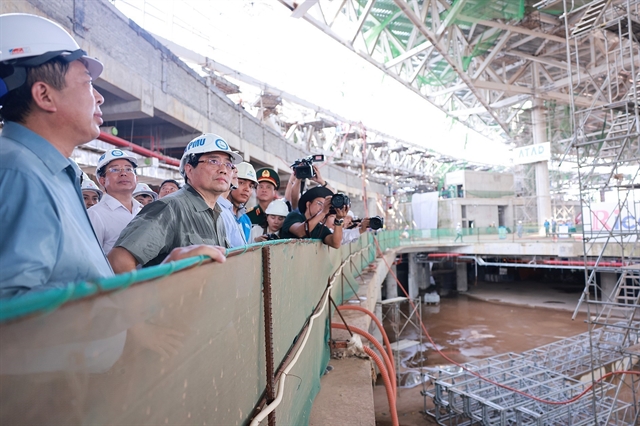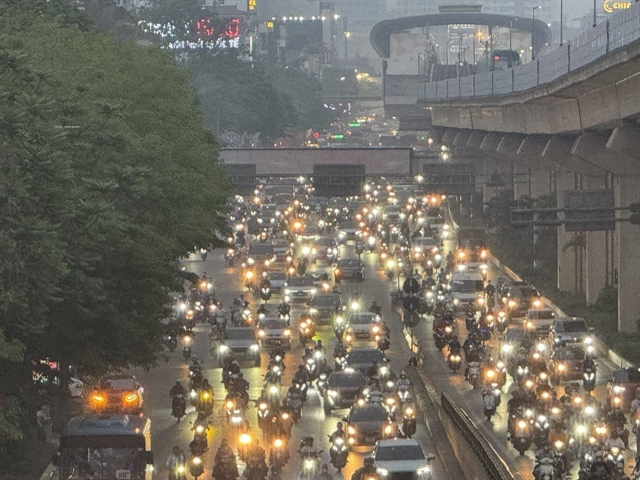 Society
Society


|
| Areas within Ring Road 1, which have about 600,000 permanent residents, will have to use green vehicles starting July 2026. — VNA/VNS Photo |
HÀ NỘI — Hà Nội's Department of Construction has proposed financial support packages ranging from VNĐ3–5 million (US$114-191) for residents switching to electric vehicles, as the capital city is gearing up for a ban on fossil fuel vehicles amid worsening air pollution.
The proposal, outlined in a draft resolution on green vehicle transition and charging station infrastructure development, is currently being circulated among relevant municipal departments for feedback. It is scheduled to be submitted to the Hà Nội People’s Committee for presentation at the September 2025 session of the People’s Council.
Under the draft, individual owners of motorbikes or mopeds powered by petrol or diesel in designated low-emission zones will be eligible for one-off cash support if they switch to green vehicles valued at VNĐ15 million ($573) or more.
The proposed support levels are: VNĐ3 million ($114) for regular individuals, VNĐ4 million ($152) for near-poor households, and VNĐ5 million ($191) for poor households.
Each individual would be eligible to receive support for one vehicle until the end of 2030.
The Department also recommends a preferential loan scheme, offering interest rates of 3 to 5 per cent per year for up to five years, with loans covering up to 100 per cent of the vehicle purchase contract. Eligible borrowers would include public service units, passenger and freight transport businesses (excluding buses) and enterprises investing in old vehicle collection and recycling facilities.
The city’s budget would also cover 100 per cent of registration fees and licence plate issuance fees for green vehicles from the resolution’s effective date through the end of 2030. Additional incentives would apply to parking service fees for green vehicles.
According to the proposal, by the end of 2026, at least 10 per cent of parking spaces in existing buildings must be equipped with EV charging points. New projects would need to meet a 30 per cent threshold. Authorities will also prioritise installing charging stations on pavements and promote investment in hydrogen and other clean fuel infrastructure.
To support this rollout, Hà Nội will subsidise 70 per cent of interest on bank loans for infrastructure projects involving clean energy stations during the first five years. Bus stations and parking lots with at least 30 per cent of their capacity equipped with charging stations will receive up to 50 per cent of the land clearance cost support and a full five-year land lease waiver.
Investors in clean transport infrastructure, especially under the public-private partnership (PPP) model, will be prioritised for land allocation and enjoy 100 per cent land lease exemptions for designated areas through 2033. The city also commits to upgrading transport and technical infrastructure to ensure effective integration with clean energy station projects.
To prevent policy inaction, the Department of Construction plans to add detailed procedures and implementation mechanisms to ensure beneficiaries can access the support as intended.
The Department is also recommending a phased approach to banning fossil fuel-powered vehicles, including a pilot ban on petrol motorbikes from January 1 to June 30, 2026, before the ban actually takes place.
From July 1, 2026, motorbikes running on fossil fuels would be banned within Hà Nội’s Ring Road 1; from January 1, 2028, the ban would extend to Ring Road 2. The same date would also see restrictions on petrol/diesel-fuelled private cars within Ring Road 2. These measures would be expanded to Ring Road 3 beginning in 2030.
Between 2035 and 2050, the city would gradually restrict all non-green motor vehicles (including CNG and hybrid vehicles), starting with Ring Road 1 in 2035, Ring Road 2 in 2040, and Ring Road 3 in 2045, with the restriction eventually applying citywide by 2050.
Fees, monitoring, and penalties
Polluting vehicles entering restricted zones would be subject to road-use charges and higher parking fees in line with the city’s outlined timeline. Hà Nội will install surveillance cameras, conduct patrols, and impose stiff administrative penalties for violations, including emissions breaches or unauthorised entry into restricted zones, with fines up to twice the current statutory levels.
Once the resolution is approved, the Department will submit a detailed implementation plan to the People's Committee. This will include assigning responsibilities to relevant departments for all policy areas, including financial support, service fee incentives, outdated vehicle management, clean fuel station development, and traffic law enforcement. — VNS






 brought the story behind the evolution to life for more than 270 global and local suppliers—highlighting how the brand reflects the company’s bold ambitions and purpose-driven growth.)


)